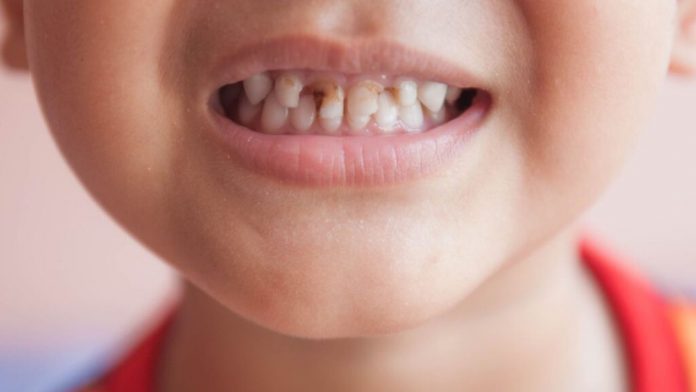Tooth decay is a common problem that affects kids, and it develops for a variety of reasons. Even though you make a point of prioritizing your child’s oral health, it might be upsetting to discover that they have yet another cavity. Despite the fact that you strictly limit sugary foods compared to other parents, it appears that their kids don’t develop cavities. However, children’s dental caries are affected by factors other only brushing and candy consumption. It involves a complicated interplay of many factors that accelerates deterioration. Understanding these elements can help you identify the root causes of cavities and take preventative action to protect your child’s priceless smile.
Here are four reasons for tooth decay in children
1. The impact of acidic food
Acidic foods and beverages like fizzy drinks and fruit juices can degrade and demineralize enamel. Demineralization of teeth is a normal process; problems arise when the body is unable to replenish the minerals lost during demineralization. Demineralization can be brought on by a variety of reasons, including as germs and the mouth’s acidic pH.
2. Bacterial effects
Many different types of bacteria live in your mouth, some of which are beneficial to you while others can cause tooth decay. Plaque, a sticky film that forms constantly on your teeth, is generated by bacteria that reside there, feed on the sugar in your food and drink, and produce acids as a result. The minerals and enamel of your teeth are eventually destroyed by these acids.
In addition to increasing germs, plaque buildup, and tooth disease, consuming too much sugary, starchy food and drink can also change the pH level of saliva. Acids in your mouth start demineralizing your tooth enamel when your salivary pH drops below 5.5. Cavities, discomfort, and other dental issues result from weakening and pore-forming tooth enamel.
3. No remineralization and unbalanced pH
Through the presence of calcium, phosphate, and fluoride that are naturally present in saliva, remineralization takes place every day after an attack by acids from meals. Minerals are now redeposited onto the enamel, making the teeth as good as new. Thus, saliva acts as a natural defense in our mouths by neutralizing acids and preventing or reversing demineralization. However, to keep things on track throughout this demineralization-remineralization cycle, an external regulating agent is required.
4. Toothpaste lacks naturally occurring calcium, fluoride, and arginine.
According to clinical studies, toothpaste with 1.5% arginine, fluoride, and natural calcium has better anti-cavity performance than toothpaste with fluoride alone. 3 A naturally occurring amino acid and component of proteins, arginine. It has shown encouraging effects in disrupting biofilm, reducing enamel demineralization and dentinal hypersensitivity, and promoting remineralization in the context of oral care.

 हिंदी
हिंदी






